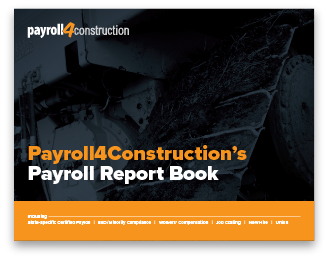Tennessee Prevailing Wage Laws: A Complete Guide for Contractors
Overview of Tennessee's Prevailing Wage Requirements
Tennessee's prevailing wage requirements apply specifically to state-funded highway construction projects, ensuring contractors pay standardized wages that reflect local labor standards for highway, road, and bridge construction work.
For any construction company working on Tennessee highway projects, Payroll4Construction is here. As a complete payroll service, Payroll4Construction is built to keep contractors compliant with certified payroll reporting and prevailing wage rate determinations.
Keep reading to learn more about Tennessee's prevailing wage laws and how we can help you.
What is Prevailing Wage in Tennessee?
Tennessee requires contractors working on state-funded highway construction projects to pay prevailing wages as determined by the Tennessee Department of Labor and Workforce Development. The Prevailing Wage Commission (PWC) has the duty of determining the prevailing wage rate for state highway (i.e. highways, roads and bridges) construction projects.
Important Note: Tennessee's prevailing wage requirements are limited in scope compared to many other states. Tennessee does not have comprehensive state-specific prevailing wage laws for most public works projects.
The state's prevailing wage requirements apply only to state-funded highway, road and bridge construction projects as covered under Tennessee's Prevailing Wage Act (Title 12-4-401). However, contractors must still comply with federal Davis-Bacon Act requirements on federally funded projects throughout Tennessee.
Within Tennessee, prevailing wage is used for government work to regulate fair pay at wages equivalent to the general workforce, so as to attract reputable contractors who will deal ethically with their workers and the government.
Don’t Let Prevailing Wage Compliance
Slow Down Your BusinessPrevailing Wage Rate Determination
Setting Highway Construction Rates
The Tennessee Department of Labor and Workforce Development conducts a survey to determine wage rates for various job classifications for state-funded highway construction projects. The data is solicited from the state's contractors annually in highway construction.
The Tennessee Department of Labor and Workforce Development must:
- Determine appropriate prevailing wages for highway construction work
- Conduct annual surveys of contractors to gather wage data
- Publish these rates for use in state highway projects
- Include these rates in all applicable project specifications and contracts
- Update rates annually to reflect current local conditions
Rate Calculation Method
The Tennessee Department of Labor follows a structured approach to determine fair and accurate compensation rates for highway construction. They establish rates by analyzing:
- Survey data from highway construction contractors across the state
- Actual wages paid on similar highway construction projects
- Regional wage variations throughout Tennessee
- Input from the construction industry when necessary
Prevailing Wage Requirements
Tennessee's prevailing wage laws establish minimum compensation standards specifically for workers on state-funded highway construction projects. These requirements ensure fair labor practices in the highway construction sector.
- Contractor

Contractors working on Tennessee state highway projects bear responsibility for ensuring compliance with prevailing wage regulations:
- Paying prevailing wages to all covered workers on highway construction projects
- Maintaining detailed payroll records for state inspection
- Understanding which projects are subject to Tennessee prevailing wage requirements
- Ensuring subcontractors also comply with prevailing wage obligations
- Following proper certified payroll reporting procedures
How to Submit Prevailing Wage Proof
Tennessee's prevailing wage compliance for highway construction projects requires contractors to maintain comprehensive documentation of wage payments and worker classifications.
Key documentation requirements include:

- Detailed payroll records showing actual wages paid
- Worker classification documentation
- Hours worked records (regular and overtime)
- Evidence of benefit payments when applicable
- Certified payroll records for state inspection
Contractors must be prepared to provide:
- Business registration information
- Workers' compensation insurance documentation
- Payroll records demonstrating compliance with prevailing wage rates
- Classification documentation for all workers
Contact the Labor Standards Unit at 844-224-5818 for specific questions about Tennessee prevailing wage requirements.
Compliance, Enforcement and Consequences
Tennessee's prevailing wage system for highway construction relies on compliance mechanisms and penalties to ensure contractors adhere to established wage standards. These measures protect workers' rights while maintaining the integrity of state highway projects.
Wage Payment Rules
Prevailing wage laws for Tennessee highway construction establish minimum compensation requirements that cannot be circumvented:
- Workers must receive prevailing rates for their job classification on highway projects
- Rates are determined through annual surveys of highway construction contractors
- Employers cannot pay below these rates on covered projects
- Accurate payroll records must be maintained and available for inspection
Violation Consequences
Contractors who fail to comply with Tennessee's highway construction prevailing wage requirements face significant consequences:
- Administrative action by the Tennessee Department of Labor and Workforce Development
- Assessment of unpaid wages plus penalties
- Potential debarment from future state highway construction projects
- Civil penalties for violations
- Requirement to make workers whole for underpayments
Worker Protections
Tennessee law includes protections for workers who report violations of prevailing wage requirements on highway construction projects:
- Protection from retaliation for reporting violations
- Protection from termination for wage complaints
- Protection from discrimination for asserting rights
- Safe reporting mechanisms for wage violations
These protections allow workers to safely report underpayment or other violations without fear of employer retaliation.
Penalties
The legal framework includes financial penalties to encourage compliance with highway construction prevailing wage requirements:
- Administrative penalties for violations
- Payment of back wages to affected workers
- Potential exclusion from future state highway projects
- Additional penalties for willful or repeat violations
How Payroll4Construction Helps You Stay Compliant
Payroll4Construction is a payroll service that offers construction solutions for prevailing wage compliance in Tennessee.
These time-saving services reduce administrative hours spent on complex wage calculations and paperwork. In turn, this gives the team peace of mind knowing that prevailing wage obligations are being handled correctly.
Payroll4Construction helps contractors in Tennessee comply with highway construction requirements by providing solutions for certified payroll reporting and wage calculations.
Federal Davis-Bacon Act Requirements
While Tennessee's state prevailing wage law is limited to highway construction, many construction projects in Tennessee are subject to federal Davis-Bacon Act requirements. Projects receiving federal funding must comply with federal prevailing wage standards.
Federal Davis-Bacon Act requirements include:
- Payment of federal prevailing wage rates on federally funded projects
- Submission of certified payroll records
- Compliance with federal wage classifications
- Detailed record keeping requirements
- Worker protection provisions
Contractors working on federally funded projects in Tennessee must understand and comply with federal prevailing wage requirements, which may differ from state highway construction rates but maintain similar worker protections and documentation requirements.
Limited State Coverage vs. Federal Requirements
Understanding the scope of Tennessee's prevailing wage coverage is crucial for contractors.
Tennessee State Prevailing Wage applies to:
- State-funded highway construction projects
- Road construction projects funded by the state
- Bridge construction projects funded by the state
Federal Davis-Bacon Act applies to:
- Federally funded construction projects exceeding $2,000
- Projects receiving federal grants or loans
- Public housing construction
- Schools and other public buildings with federal funding
Projects not covered by either:
- Purely private construction projects
- Local government projects without federal funding
- State projects other than highway construction
When in doubt, contractors should follow the higher wage standard to ensure compliance with all applicable regulations.
Prevailing Wage Exceptions
Most state-funded highway construction projects in Tennessee must adhere to state prevailing wage laws. However, certain exemptions exist under specific circumstances.
These exemptions don't release contractors from fair wage obligations. Instead, the exemptions allow them to follow alternative regulatory frameworks that still maintain worker protections and compensation standards.
Projects may be exempt from Tennessee-specific prevailing wage requirements if they:
Are not state-funded highway construction projects:
- Private highway or road construction projects
- Local government road projects without state funding
- Non-highway state construction projects (buildings, facilities, etc.)
Follow the federal Davis-Bacon Act requirements because the job receives federal funding.
- The Davis-Bacon Act establishes its own prevailing wage determination system
- Contractors must still maintain detailed, accurate records for payroll
- Federal wage classifications may differ from state calculations but maintain worker protections
- Compliance with federal standards requires the same rigorous documentation and enforcement
-
Qualify for specific statutory exemptions such as:
- Emergency repair work on highways
- Maintenance work that doesn't qualify as construction
- Specific projects explicitly exempted by law
- Certain types of material suppliers
In all cases, contractors remain responsible for understanding which wage standards apply to their projects. When in doubt, following the higher wage standard ensures compliance with all applicable regulations.



